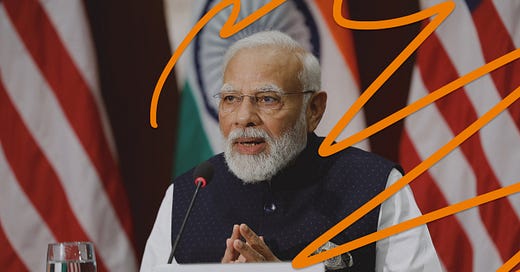Hello from the diasporic battleground!
This week, we’re joined by investigative journalist and filmmaker Anjali Kamat to discuss Prime Minister Narendra Modi’s red-carpet state dinner and the spread of his Islamophobic, anti-democratic Hindutva ideology. (1:45) We start with a short history since Modi was elected in 2014, (12:20) dig into the conspiratorial lynchings that mirror right-wing campaigns in other countries, and (26:15) consider how Indian diasporic communities help maintain (and challenge) Modi’s power. We also track the responses of U.S. politicians, from Trump’s “Howdy Modi” rally in Texas, celebrating the Prime Minister’s reelection in 2019, to progressive Representative Ro Khanna’s unwillingness to critique and Obama’s surprising willingness to do so.
In this episode, we ask:
What differentiates the last nine years under Modi from previous periods of large-scale sectarian violence in India?
Why do the myths around Modi persist, despite cracks in the facade of him as an efficient and non-corrupt leader?
What was the dream of Indian multiculturalism?
How do Indian diasporic communities influence Modi’s ability to consolidate power?
For more, check out:
Aparna Gopalan in Jewish Currents, on how Hindu nationalists are using the pro-Israel playbook
An opinion piece by Maya Jasanoff: Narendra Modi Is Not Who America Thinks He Is
Background on the rise of Hindu nationalism in the U.S.
The first installment in our White House State Dinner critique series, from May: Karaoke soft power + left media cowardice
🎧 Heads-up: Next week’s episode will be a subscriber-only listener Q&A! Subscribe on Patreon or Substack to ask a question and hear the episode.
Thanks for listening. As always, you can follow us on Instagram, TikTok, and Twitter, and email us at timetosaygoodbyepod@gmail.com.







Share this post